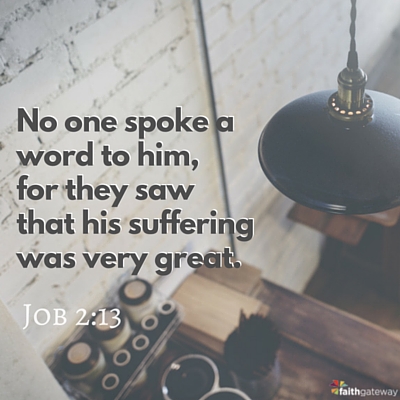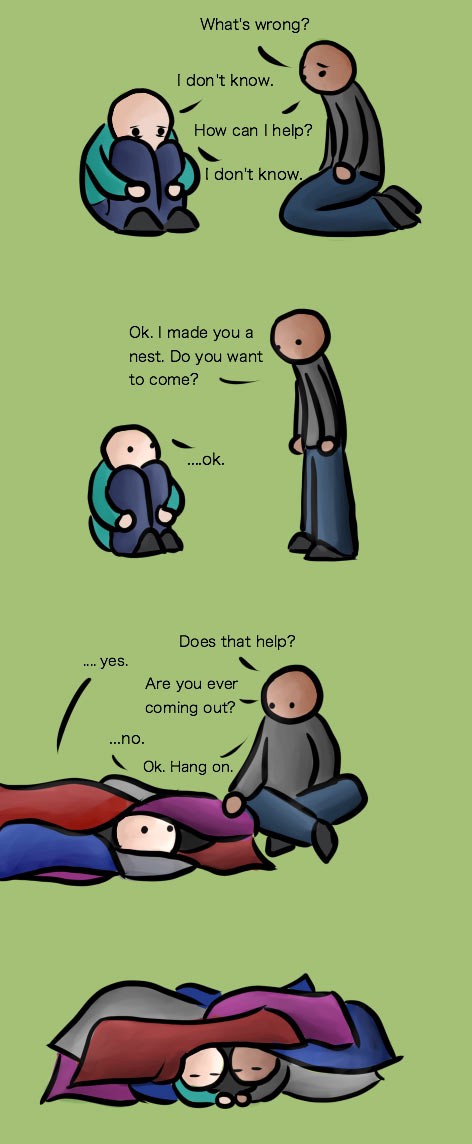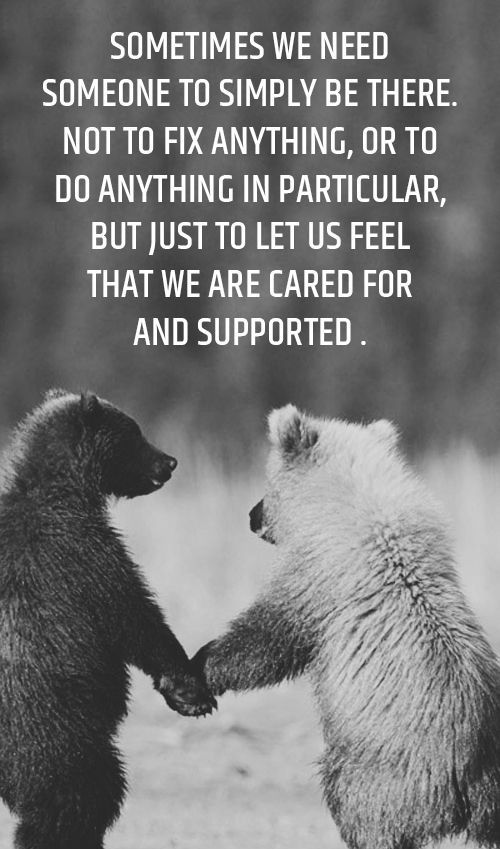Then they sat on the ground with him for seven day and seven nights.
No one said a word to him, because they saw how great his suffering was.
Job 2:13

This passage comes from the Biblical story of Job.
A book that teaches us a lot about suffering and loss.
Job suffers an incomprehensible amount of grief in a short period of time.
He loses his home, his livelihood, and his children.
All at once.
So his friends do what any good friends would do – they decide to go visit him.
His three friends agree to travel to visit their friend and when they find him he is in such deep grief they almost don’t recognize him.
So what do they do?
“They began to weep aloud, and they tore their robes and sprinkled dust on their heads.” (verse 12)
Both of these are symbols of grief and mourning.
These guys were joining their friend in grief, symbolically and physically.
Then … they sat.
And sat…
And sat…
For seven days.
They all sat on the ground and said nothing.
Not one thing.
They just sat there. In silence.
Phew.
I don’t think we would be very good at this these days.
This practice of seven days of sitting on the ground and being silent together is called sitting shiva.
I wish we still did it actually.
I know it would be almost impossible for me, but I do wish we did it.
I’m a talker. (I know, you’re shocked)
A verbal processor,
And a fixer.
A lot of us are like this.
Oh we don’t like to admit it, but it’s true.
We don’t like silence all that much, and we often don’t know what to do in the face of grief or suffering.
We don’t want to see the physical reminder of someone’s struggles.
We don’t reeeeeally want to know how difficult things really are.
We want to hear the story of how hard it was AFTER someone is “all better.”
AFTER they “get through” it.
But that’s not what this practice is about.
Eventually, Job’s friends do start to talk, and then they make all sorts of wild claims about why this horrible stuff happened. They are usually used as examples of what not to say in times of suffering.
In fact, you get the idea through this story that maybe Job would have been better off if his friends hadn’t said anything at all.
But despite the many lessons there are in this story of Job of how to respond in the midst of suffering today I want to focus on just two that I have found to be helpful:
- They came.
- Job speaks first.
First, the friends came.
They didn’t have to.
They could have just sent a card.
But they came.
They were likely really uncomfortable.
They likely didn’t know what to do, or what they were going to find when they got there, but they came.
They didn’t let the not knowing and the awkwardness and fear prevent them from at least trying.
I think it’s really easy to assume that someone you know who is going through something is probably getting a lot of support. Or to assume that you don’t have anything to offer.
Job’s friends didn’t have a lot, in fact, they had pretty crappy answers once they did start speaking, but they were there.
Over and over again, people in the midst of difficult times say that just knowing someone was available was enough. Even if they never take you up on what you offer.
It’s better than pretending everything is ok when it’s obviously not ok.
Job’s friends, for all their faults, didn’t let the fear of saying the wrong thing prevent them from showing up.
And second, they didn’t speak until Job did.
One of my favorite artist/authors Emily McDowell says that “When the silence of listening is uncomfortable, it’s not because silence is a problem. It’s because you aren’t used to it.”
It’s tough to listen, to let the person who is suffering speak without you adding anything to the mix, but sometimes, you have to just sit, even if it takes seven days for them to begin to wrap their head around what the heck is happening. Job’s friends stayed silent until Job spoke.
They let him direct the show because it was his grief and his suffering.
Fixers, helpers and people with big hearts like I know a lot of you uplifters are,
we tend to speak first to help move things along and make it better faster.
Job’s friends, for all their mistakes later, let Job lead the way first. They didn’t make things worse until they thought they had the right answers or could fix it.
So let’s learn from them.
You absolutely know someone who is suffering today.
You know someone who is going through something really difficult.
someone who is sick,
or grieving the loss of someone they love,
or struggling through a rocky marriage,
or mourning another miscarriage,
or dealing with a diagnosis they don’t understand or know how to handle.
You know.
Go.
Be with them.
Sit in silence.
Ask how they are today, right now.
Ask how you can help.
And then listen. They’ll talk when they’re ready.

Lastly, if you are the one in need,
if you are struggling and sitting on the ground in despair today,
I’m here.
I’m with you.
We’re here. This community is here.
We’re with you.
Ready to sit. To be silent. To listen when you’re ready.
 PS. If someone can explain to me why two bears “holding hands” makes any sense with this quote I’d love an explanation. I mean, bears don’t do what the quote is saying in real life… so why not have two people? Why bears? I just don’t get it.
PS. If someone can explain to me why two bears “holding hands” makes any sense with this quote I’d love an explanation. I mean, bears don’t do what the quote is saying in real life… so why not have two people? Why bears? I just don’t get it.
